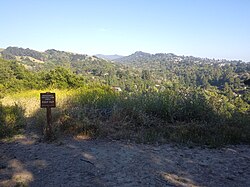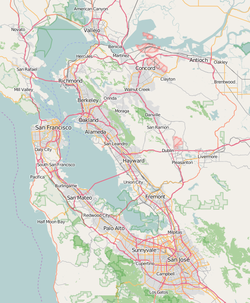Wildcat Canyon Regional Park
| Wildcat Canyon Regional Park | |
|---|---|
 Wildcat Canyon vistas 2019 | |
| Location | Contra Costa County |
| Coordinates | 37°56′05″N 122°17′09″W / 37.93472°N 122.28583°W |
| Area | 2,429-acre (983 ha) |
| Operated by | East Bay Regional Park District |
Wildcat Canyon Regional Park is a 2,789-acre (1,129 ha) East Bay Regional Park District (EBRPD) park bordering the city of Richmond in Contra Costa County in the San Francisco Bay Area of California.[1] It includes a portion of Wildcat Canyon as well as a portion of the adjoining San Pablo Ridge, and is directly connected to the more heavily used Tilden Regional Park.
History
[edit]The area was inhabited by Native Americans until 1772 when a group of "Catalan volunteers" led by Pedro Fagas and Fray Juan Crespi came across the settlement while searching for trade routes north beyond the Carquinez Strait. The Spanish settled the general area and by 1840 had parceled the land for missions and cattle raising coming into conflict with the historical communal practices of the Native Americans. Juan Jose and Victor Castro were given rights to all vacant land in the area. They kept some valuable lands and gave much of the land over to municipal authorities for water usage. In 1935, the East Bay Regional Parks District acquired the land that formed Tilden Park to the South and continued to acquire land to the north of Tilden until in 1976 it had sufficient land to form Wildcat Canyon Regional Park.[2]

EBRPD announced on February 17, 2014 that it had acquired 362 acres (146 ha) of woodland on the east side of the park, which would be added to the park's existing 2,428 acres.[3] The addition will allow easier access for visitors from El Sobrante and Richmond (via a planned trailhead and staging area on San Pablo Dam Road) and connects the park to the Kennedy Grove Regional Recreation Area and San Pablo Reservoir.[1][4]
Flora
[edit]Wildcat has an abundance of wildlife both flora and fauna. There are coast live oak, California bay laurel, bigleaf maple, madrone, alder, willow, dogwood, and eucalyptus forests. There are humid chaparrals made up of coyote brush, poison oak, elderberry, snowberry, bracken fern, and blackberry brambles.
There are some native grasses, but non-native species like rye, barley, and oat dominate, however many kinds of native flowers are present.[2]
Fauna
[edit]With regards to animal life there are coyotes, foxes, raccoons, skunks, opossums, deer, California ground squirrels often thought to be gophers in addition to voles present.
Reptilian life includes gopher snakes, king snakes, western racers, garter snakes, rubber boas, ringneck snakes. In the skies red-tailed hawks, American kestrels, sharp shinned hawks, cooper's hawks, ravens, and turkey vultures fly and also great horned owls and many songbirds.[2]
Major trails
[edit]Wildcat Creek Trail - Runs along Wildcat Creek from the Alvarado Staging Area in Richmond into Tilden Park's Nature Area. The Wildcat Park section measures 3.5 miles to the park border and continues for 1 mile to the Tilden Nature Area parking lot. The trail is wide and does not involve major elevation changes. The trail's midpoint can be accessed via Rifle Range Road Trail accessed via Rifle Range Road in El Cerrito, California.
Nimitz Way - Starting at Tilden Park's Inspiration Point, Nimitz Way (named after Admiral Chester W. Nimitz) is a mostly paved trail that connects to Wildcat Canyon Park after 1.5 miles. The Wildcat section is 2.51 miles long and connects to San Pablo Ridge Trail. Nimitz Way is a popular, relatively easy trail with views of the San Francisco Bay to the west and EBMUD's San Pablo & Briones Reservoirs and Mt. Diablo.
Belgum Trail - Accessed from Wildcat Creek Trail about 0.5 miles from the Alvarado Staging Area, it climbs quickly over a relatively short 0.85 miles to Wildcat Canyon's meadows and provides excellent views of San Francisco Bay. The ruins of the Belgum Sanitarium and the palm trees planted by its founder, Hendrick Belgum, are visible from the trail.[2]
San Pablo Ridge Trail - Accessed from Belgum Trail or Clark-Boas Trail, which runs from the Clark Road park entrance in Richmond, the San Pablo Ridge Trail is a short 1.43 miles but climbs over three peaks. The trail connects at its southern terminus with Nimitz Way.[2]

Other features
[edit]
Alvarado Area, is a National Historic Place is the northernmost portion of Wildcat Canyon.
The two-mile (3.2 km) section in Wildcat Canyon Regional Park was a Nike missile base which was decommissioned in the 1970s. Today there are few signs of the missile silos and military housing that used to populate these hills.
Wildcat Canyon Regional Park hosts cattle who graze the hills of the park under a grazing program managed by the East Bay Regional Park District.[2]
Accessing the Park
[edit]The park can be accessed via the following entry points:
- The main entrance and park office is the Alvarado Area on Park Avenue in Richmond reached from McBryde Avenue.
- The Clark Road entrance in the northernmost area of the park is accessed off of San Pablo Dam Road.
- Rifle Range Road in El Cerrito
- Monte Cresta Avenue in Richmond
- Park Avenue in Richmond
References
[edit]- ^ a b Jones, Carolyn (2014-02-16). "Contra Costa County getting a big chunk of new parkland". SFGATE. Retrieved 2022-05-08.
- ^ a b c d e f East Bay Regional Park District (May 2011). "Discover Wildcat Canyon" (PDF). Archived from the original (PDF) on 11 September 2011. Retrieved 2022-05-07.
- ^ Downing, Bob (June 29, 2002). "East Bay Brilliance". Newspapers.com. Retrieved 2022-05-07.
- ^ Jones, Carolyn. San Francisco Chronicle. "Big Tract of pristine acreage being added to East Bay hills parklands." February 17, 2014. Retrieved February 18, 2014.
External links
[edit]- Wildcat Canyon Regional Park at the East Bay Regional Park District website
- Park Information and Trail Map from East Bay Regional Park District website



